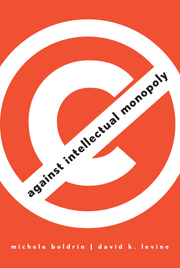Book contents
- Frontmatter
- Contents
- Acknowledgments
- 1 Introduction
- 2 Creation under Competition
- 3 Innovation under Competition
- 4 The Evil of Intellectual Monopoly
- 5 The Devil in Disney
- 6 How Competition Works
- 7 Defenses of Intellectual Monopoly
- 8 Does Intellectual Monopoly Increase Innovation?
- 9 The Pharmaceutical Industry
- 10 The Bad, the Good, and the Ugly
- References
- Index
- Plate Section
10 - The Bad, the Good, and the Ugly
Published online by Cambridge University Press: 30 July 2009
- Frontmatter
- Contents
- Acknowledgments
- 1 Introduction
- 2 Creation under Competition
- 3 Innovation under Competition
- 4 The Evil of Intellectual Monopoly
- 5 The Devil in Disney
- 6 How Competition Works
- 7 Defenses of Intellectual Monopoly
- 8 Does Intellectual Monopoly Increase Innovation?
- 9 The Pharmaceutical Industry
- 10 The Bad, the Good, and the Ugly
- References
- Index
- Plate Section
Summary
In a famous 1958 study on the economics of the patent system, the distinguished economist Fritz Machlup, paraphrasing an earlier statement by his longtime coauthor Edith Penrose, concluded
If we did not have a patent system, it would be irresponsible, on the basis of our present knowledge of its economic consequences, to recommend instituting one. But since we have had a patent system for a long time, it would be irresponsible, on the basis of our present knowledge, to recommend abolishing it.
Almost fifty years later, the first half of this illustrious sentence is more valid than it has ever been. Sadly, the recommendation has not been followed: far from maintaining the status quo, the patent system has been enormously extended, and there is no sign of the end of the expansion of intellectual monopoly to every corner of our economic system. Moreover, the fifty years since have turned up no evidence that patents serve to increase innovation. It is time to reconsider the second recommendation.
Defenders of intellectual monopoly like to portray intellectual property as a powerful and beneficial medicine. If a medicine has serious side effects and scientific studies have found at best weak evidence of temporary benefits, would you employ such a drug on an otherwise healthy patient? Probably not, unless the illness was life threatening.
- Type
- Chapter
- Information
- Against Intellectual Monopoly , pp. 243 - 270Publisher: Cambridge University PressPrint publication year: 2008
- 2
- Cited by



